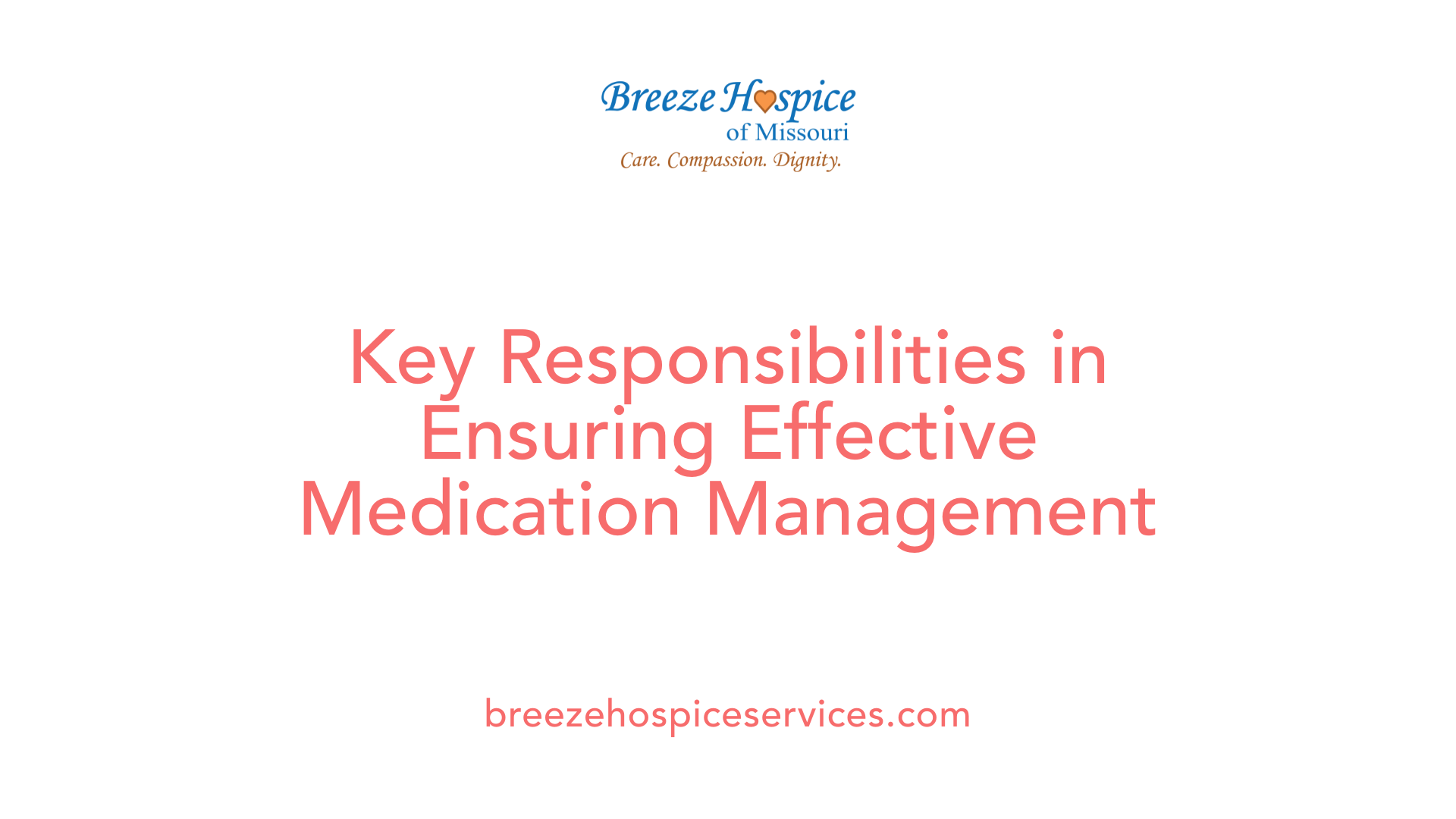The Role of Medication Management in Daily Living Assistance
April 4, 2025
Navigating Daily Living Through Effective Medication Management for Seniors

Understanding the Complex Landscape of Medication Management
Medication management plays a pivotal role in the daily lives of older adults, especially those in assisted living and memory care environments. As our population continues to age, with seniors often managing multiple prescriptions, the complexity of medication regimens escalates. This narrative explores the crucial elements of medication management, its impact on day-to-day living, and the challenges faced by caregivers in ensuring safe and effective medication use.
The Importance of Effective Medication Management

What is the importance of medication management?
Medication management is crucial for ensuring patient safety, particularly among older adults who often juggle multiple prescriptions for chronic conditions. It plays a significant role in minimizing medication errors and preventing harmful drug interactions that can arise from polypharmacy, where seniors take five or more medications.
Effective medication management provides healthcare providers with a comprehensive overview of a patient's medications and health records. This information is essential for making informed clinical decisions and adjusting treatment plans based on the patient's evolving health needs.
Ensuring patient safety
To enhance patient safety, various tools and initiatives support medication management. For instance, the National Residential Medication Chart (NRMC) and its electronic counterpart streamline prescribing processes in residential aged care. These systems significantly reduce administrative burdens and improve efficiency in medication administration.
Minimizing medication errors
By implementing structured approaches like Active Ingredient Prescribing (AIP) and Home Medicines Reviews, healthcare professionals can standardize medication information. This standardization is vital in enhancing adherence and reducing the likelihood of adverse drug events, which cause approximately 1.3 million emergency department visits annually due to mismanagement of medications among seniors.
Enhancing communication
In addition, effective medication management fosters better communication among healthcare providers, caregivers, and patients. With tools designed for medication tracking and reminders, seniors can maintain more consistent medication schedules, ultimately improving health outcomes. Empowering patients with knowledge about their treatment also helps bridge any informational gaps, giving families peace of mind regarding their loved ones’ health management.
Impact on Daily Living for Seniors

How does medication management impact daily living for seniors?
Effective medication management significantly impacts daily living for seniors by promoting health safety and enhancing overall well-being. In the U.S., over 60% of seniors rely on prescription medications, making proper oversight critical to prevent errors like overdoses and drug interactions.
The established 'seven rights' of medication administration—right patient, right medication, right dose, right route, right time, right reason, and right documentation—ensure accuracy in medication delivery. This is especially vital in assisted living and memory care settings, where seniors often deal with age-related issues such as cognitive decline.
Regular monitoring of medication adherence not only helps maintain seniors' independence, but it also plays a significant role in improving their quality of life. For instance, proper medication oversight can avoid complications like missed doses or adverse reactions, which frequently lead to hospitalizations.
When seniors have adequate support and structured programs in place, they are better equipped to navigate daily challenges without the need for more intensive care, such as nursing homes. Conversely, insufficient medication management can result in heightened healthcare needs and reduced quality of life. Therefore, effective medication management is essential in enabling seniors to manage their health actively and enjoy a more fulfilling life.
Responsibilities in Medication Management

What is the responsibility of medication management?
The responsibility of medication management encompasses a comprehensive approach to ensuring the safe and effective use of medicines within healthcare settings. This includes the following core components:
- Safe Prescribing: Healthcare professionals must prescribe medications cautiously, considering patient history and potential drug interactions.
- Dispensing and Administration: Medications must be dispensed accurately, with administration conducted according to prescribed guidelines to avoid dosing errors.
- Monitoring: Continuous monitoring of patient responses to medications is vital to catch any adverse effects or complications early.
- Medication Reconciliation: This process involves comparing a patient’s current medications with those prescribed to prevent errors, especially during transitions in care.
Monitoring and error prevention
To ensure the safety of medication management, health service organizations should implement robust governance systems. This includes documenting patient information accurately and facilitating continuity of care. Additionally, patients should be educated about their medications, encouraging their involvement in the decision-making process regarding their treatment. Special consideration is necessary for high-risk medicines, which often require systematic assessments and compliance audits to minimize risks associated with their use. By taking these steps, organizations can significantly reduce the likelihood of medication errors and enhance patient outcomes.
Roles and Best Practices in Medicines Management

What is the role of medicines management?
The role of medicines management encompasses a comprehensive approach to the procurement, prescribing, dispensing, administration, and monitoring of medications. This process is vital for ensuring that patients, particularly seniors, receive optimal therapeutic outcomes while minimizing associated risks. Managing medications effectively is crucial for avoiding complications from polypharmacy, such as adverse drug reactions and medication errors.
A significant aspect of medicines management is the collaboration among healthcare professionals, including pharmacists, physicians, and nurses. Their collective expertise ensures a coordinated approach that enhances the safety of medication practices. For caregivers, having the right tools—like pill organizers and medication apps—can simplify the management process, enabling better adherence to prescribed regimens.
Education plays a crucial role in this framework. Patients and their families must understand the purpose of medications, potential side effects, and the importance of adherence. Such knowledge helps patients feel empowered in their treatment, leading to better health outcomes. Additionally, leveraging technology, such as electronic prescriptions and management software, can greatly enhance efficiency and accuracy in medication administration, thus preventing possible errors and adverse events.
Patient outcomes optimization
Optimizing patient outcomes means tailoring medication plans to the unique needs of individuals. Effective medicines management facilitates this through thorough reviews of medication regimens, personalized adjustments, and ongoing monitoring. In community settings like assisted living, caregivers often report that structured support significantly enhances the health and quality of life of residents.
Risk minimization
Risk minimization involves addressing factors that may lead to negative health impacts. Key strategies include using clear safety protocols for medication handling, incorporating safety measures in medication administration, and ensuring proper storage and disposal of drugs. By maintaining these standards, facilities can help mitigate risks associated with polypharmacy among seniors.
Collaboration among healthcare professionals
Collaboration is foundational in medicines management. Continuous communication between caregivers, healthcare providers, and families ensures that any changes or concerns regarding a patient's medication can be addressed promptly. This holistic approach is especially beneficial for older adults who often juggle multiple prescriptions, as it enhances transparency and fosters a supportive environment for adherence.
Medication Management in Assisted Living
How is medication management conducted in assisted living?
Medication management in assisted living is a structured process that ensures residents take their medications safely and correctly. This process includes a variety of activities aimed at minimizing the potential for errors and maximizing the health benefits of medications.
Key components of medication management involve:
- Safety and Proper Administration: Caregivers ensure that each resident receives the correct medication at the appropriate time, adhering to the seven rights of medication administration: right resident, right drug, right route, right time, right dose, right documentation, and right response.
- Compliance with Regulations: Assisted living communities must comply with state regulations, which dictate how medication management protocols are implemented. This may include oversight by nurses or certified medical technicians who are trained in medication administration.
- Role of Caregivers: Caregivers perform both direct and indirect activities associated with medication management. They assist with organizing medications, tracking adherence, and communicating with healthcare providers regarding any changes needed in a resident's medication plan.
The popularity of various tools—like pill organizers and medication reminder apps—can aid caregivers and residents alike in maintaining proper medication schedules. Ultimately, the goal is to promote adherence and safety, enhancing the quality of life for seniors in assisted living settings.
Caregiver Challenges and Solutions
What challenges do caregivers face in medication management for older adults?
Caregivers play a pivotal role in medication management for older adults, yet they encounter a slew of challenges. One major obstacle is ensuring medication adherence among elderly patients who may struggle with complex regimens due to multiple chronic conditions. With over half of caregivers administering five or more medications daily, the intricacies of these medication schedules can be overwhelming.
Furthermore, caregivers frequently grapple with complex regimens that require meticulous management. This complexity increases the risk of missed doses, overdoses, or harmful drug interactions. The lack of formal training exacerbates these issues; many caregivers report feeling unprepared, with nearly 50% having received no training on medication management. This gap in knowledge can lead to significant health risks for their care recipients.
Additionally, barriers such as cognitive decline can hinder elderly patients’ ability to manage their medications effectively, contributing to adherence rates that can be as low as 50%.
To tackle these challenges, several solutions have emerged. For instance, medication management tools like pill organizers and reminder systems can streamline the process. Educational interventions for caregivers, as well as pharmacist-led initiatives, have demonstrated promise in enhancing medication adherence and mitigating some of the barriers presented by complex regimens.
Ultimately, addressing these issues is crucial for improving health outcomes for older adults and ensuring that caregivers feel supported and equipped to manage medications effectively.
Innovative Tools for Medication Management

What tools are available for medication management for older adults?
Managing multiple medications can be a daunting task for older adults, but innovative tools are available to simplify this process. These tools not only help in maintaining adherence but also enhance safety when taking multiple prescriptions.
Medication Reminder Apps: These applications are designed to send timely alerts to users about their medication schedules. For instance, apps like Medisafe and MyTherapy allow seniors to track when to take their medications while also providing reminders to refill prescriptions.
Pill Organizers: Simple yet effective, pillboxes help keep medications organized by dividing doses for different days and times. They are essential for preventing missed doses, especially when managing multiple prescriptions.
Automated Dispensers: Devices like Hero and MedMinder automate the dispensing of medications. These dispensers alert users when it’s time to take their pills and can even notify caregivers if a dose is missed. This feature provides peace of mind for family members concerned about their loved ones' adherence to medication regimens.
Smart Dispensing Devices: Other notable devices such as the MedCenter Talking Alarm Clock offer audio cues to remind individuals to take their medications, while also displaying clear instructions.
How can technology enhance medication management?
The marriage of technology and medication management expresses itself through various applications and devices that cater specifically to older adults. These technological advancements include:
- Monitoring Tools: Solutions like Medi-Cog assess cognitive literacy and pillbox skills, ensuring users can manage their medications effectively.
- Feedback Systems: Tools such as MedMaIDE™ focus on older adults' abilities to self-administer medications correctly, providing guidance wherever necessary.
Overall, the use of these innovative tools significantly enhances medication safety, adherence, and health outcomes for seniors, reducing potential risks associated with mismanagement. By adopting these methods, elderly individuals can navigate their treatment plans more successfully and safely.
Conclusion: A Path Forward in Medication Management
Effective medication management is indispensable for enhancing the quality of life for seniors, particularly in assisted living environments. With the rising complexity of medication regimens due to multiple prescriptions, both caregivers and healthcare providers face an increasing obligation to ensure safety, compliance, and optimal health outcomes. By integrating technology, enhancing communication, and focusing on patient education, we can address existing challenges and move towards more robust systems of care that safeguard our aging population's health. As we continue exploring advances in medication management, the shared goal remains clear: to create a landscape where seniors can enjoy a safer, healthier, and more independent daily life.
References
- Medication management activities performed by informal caregivers ...
- Examining Medication Management and Regulation in Assisted Living
- What's Medication Management and Why Is It Important?
- What is Medication Management? - The Gallery Senior Living
- Why Is Medication Management Important for Seniors?
- Comprehensive Guide to Medication Management for Seniors
- Medication Management in Assisted Living | Hebrew SeniorLife
- Assisted Living Delphi Medication Optimization White Paper - caltcm
- Why Is Medication Management Important? - AdventHealth
- 8. Assistance with Activities of Daily Living (ADLs) - ATrain Education |


































































































